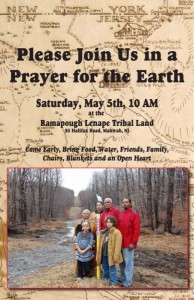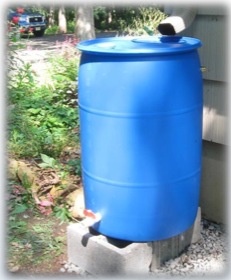 Saturday, May 5, 2012
Saturday, May 5, 2012
12:00pm
95 Halifax Rd. Mahwah, New Jersey 07430
Native Tribes & Local Communities BAND TOGETHER to Bridge Cultures
for the Preservation & Protection of our Water from Hydraulic Fracking
The Ramapough/Lunaape Nation is calling on all humans of good conscience to join a Prayer Rally/Vigil on our Ceremonial Land:
Why? This is the time, this is the hour to speak out for the protection of all US Watersheds that supply everyone with fresh drinking water, preserve Native traditions, and for the healing of Grand Mother Earth.
The Ramapough are expecting an array of communities, native peoples, environmental groups, representative of diverse cultural and spiritual traditions. Several of the guest speakers include:
-Professor Airy Dixon/Saponi
-Chief Vincent Mann/ Ramapough Nation
-Dean Hutchins Cherokee Nation
-Monica Evans/Haida Nation.
There will also be light entertainment. Please bring chairs and blankets. This event will close in Ceremony with a Prayer for Grand Mother Earth.
The Ramapough’s traditional land has met with imprudence from numerous outside groups, including Ford Motor Company – which used our land as a “toxic dumping ground”, and now gas/oil corporations want to endanger our vital watersheds by hydrofracking for export to foreign markets. To create this supply of fracked gas would involve blasting and clearing of public and private land, creating hazards for communities in the Pennsylvania, New Jersey and New York regions which includes the beautiful Long Island Sound. Fracking fluid contaminates water sources, poisons ecosystems [animal & plant], and is currently suspect to have caused earthquakes in Ohio.
The Ramapough believe that callous disregard for humans and Grand Mother Earth cannot go unanswered. The Ramapough assert: it is the civic duty of all people of good conscience everywhere to ensure change be just, rather than a reinforcement of finance inequities that have so long divided us. To that end, we are asking everyone to join in making their voices heard on behalf of families, community, our watersheds, and Grand Mother Earth against this current atrocity.
Ramapough Lunaape Chief Perry(Kihkay Maqua) states:
“We have chosen to hold this event now because the hour is critical for America. The destructive extraction of gas/oil resources from our Grand Mother Earth is almost complete. We hope this event will result in “An Awakening, an Occupation of the Spirit”, whereby each and every human concerned with the Earth and Future Generations will stand together as “One Voice”, accumulating the collective strength of millions. Knowing we are not alone, that each action is not an isolated action but supported by millions who vote, sends an important message to our elected officials & the gas/oil corporations that our tax dollars can no longer be used to literally poison us. The potential increase to medicaid costs will skyrocket for these toxins will cause long term damage.
I ask in a good way, that each and everyone of you who hold a drop of knowledge to come forth now; share, teach, put down some medicine, send up some sounds, help in any way you can for our Grand Mother is in pain. Join those who have been speaking out and those who have been keeping us alive. Stand Up Now, help us to pray. Show us how to heal in a good way our Grand Mother Earth for she is crying out for our assistance. Remember who you are, Humans. Remember you are dependent on Grand Mother Earth to sustain your lives.”
The Ramapough have lived in this area for over 15,000 years, with unfortunately a long tragic history that drove a wedge between the Ramapough and the community at large; a gap we are seeking to bridge with this event. We are honoring our past and seeking to move forward as a strong coalition that will address issues common to all communities.
Rain Date: Sunday, May 6th, 2012
for more information contact: Charlene – charlene@ramapoughlenapenation.com
Jill – jillll@optimum.net
Jon – jonlrucker@gmail.com

